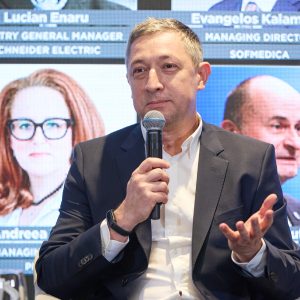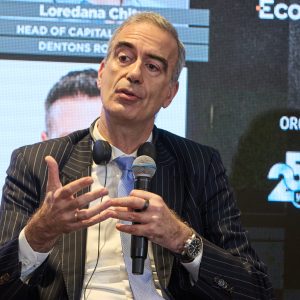:quality(80)/business-review.eu/wp-content/uploads/2023/11/Small_NEAN5663.jpg)

This area of sustainability is a hot area. And we see the demand from our partners and clients who come from this area. Schneider Electric, in addition to the international recognition it has received in recent years in terms of sustainability, we are recognized and have been recognized as a champion of sustainability.
Schneider Electric reports daily, quarterly, in detail, those parameters that are related to sustainability, so not only do we report them, but we also monitor the progress, and we also want to see a positive progress. A few days ago, a new legislative code has been implemented in Romania, the Romanian Code of Sustainability. At last, we also have in Romania the possibility to report and to follow, at a local level, a clear methodology. It is true that it is aligned with European standards or with sustainability requirements at a global level, but we can have a guide at the moment and we can monitor and report according to standards.
In the next period it will be very interesting to see the evolution of these reports. It is true that they will be mandatory from 2025, so we have a year, 2024, at our disposal, to prepare ourselves. Schneider Electric is actively involved in the sustainability story. When it comes to technologies that help, such as automation, energy efficiency, solutions and especially services in the energy sector. If we want to report, we need to have data. The first step to report something is to measure. The next step is to automate, to make it more efficient and, not last, we need to make this data management.
What do we do with this data? How do we interpret them? Where do we interpret them? At the moment, the players in the market, whether we are talking about a player in the real estate, retail, industry field, they have access to ultra-performance technologies, which start from the bottom level of the products, equipment, interconnected, go further into the control area and end up in the cloud area, where there are sophisticated software solutions that allow the analysis of all these data, their interpretation and interaction in real time with the users of these applications.
I think a very interesting and very challenging period will follow, especially since we have funding available. There are European funds, state aid, private investments, public investments. And because today we are in a field where we are talking about foreign investments, I am happy to see in the last period in Romania foreign investments, which not only propose to create new objectives or bring new technologies into the market, they propose to install or implement objectives, net zero.
Loredana Chitu, Partner and Head of the Capital Markets at Dentons

The sustainable component of investments has become pivotal in capital markets, not only in recent years, with the discussion of official regulations at European and Romanian levels, but even earlier. Investors have consistently inquired about the green aspect of a business, particularly from the perspective of corporate governance. They question the issuer’s objectives, their compliance, and their future plans. This interest has evolved over time, transitioning from a ‘nice-to-have’ to a crucial requirement. Now, investors not only prefer to see such elements in a business plan but certain investor categories outright reject investments lacking a green aspect or other sustainability components.
In this context, it’s unsurprising that the largest initial public offering (IPO) in Europe this year, which raised 1.9 billion euros, was by Hidroelectrica, a green enterprise. Amid a slightly declining capital market this year, Hidroelectrica’s 100% green business operation was undoubtedly a significant factor in the success of these offers. Thus, the importance of sustainability in business is increasingly evident.
Now, as I mentioned, investors scrutinize each element of ESG (Environmental, Social, and Governance) criteria. They assess the environmental impact of a business and examine the corporate governance rules implemented by the issuer. As lawyers preparing companies for listing, we engage in discussions about management components, focusing on the independence of administrators and ensuring a gender balance. We also discuss compliance with environmental protection regulations. At the European level, the regulation concerning the prospectus we adhere to in preparing a listing issue mandates full disclosure of a company’s environmental friendliness.
This focus on sustainability is clearly on the rise, influencing not just equity but also bonds. Investors are increasingly purchasing financial instruments dedicated to sustainability, such as green bonds, social bonds, or sustainability-linked bonds.
For a Romanian issuer, for instance, issuing green bonds is challenging, as they must ensure the invested funds are genuinely directed towards green initiatives. However, we have had considerable success in this area. Additionally, in Europe, the market for sustainable bonds, or so-called transition bonds, is growing. These bonds don’t necessarily require the proceeds to be used for specific purposes. Instead, they are linked to Key Performance Indicators (KPIs) related to sustainability, which issuers commit to achieving.

You might wonder, what connection does healthcare have with a circular, green economy? Sustainable investments are fundamentally about the long term – they endure over time. In planning sustainable investments, one must consider the long-term trade-offs. Consider the evolution of energy sources, from wood to coal, and then to oil. Each shift brought a benefit: higher energy density in a smaller volume, facilitating long-term growth.
However, these energy sources also had long-term drawbacks, such as pollution. This realization led to the shift towards green energy sources like wind power and photovoltaics, which, despite having lower energy density, offer long-term environmental benefits and cost-effectiveness. To facilitate this transition, corporate governance regulations were implemented in public markets to ensure accountability for environmental commitments.
The same principles apply to healthcare, which I believe is crucial for long-term societal and economic development. Healthy, economically active people drive growth and development. Healthcare systems, especially state-funded ones, should focus on achieving superior clinical outcomes. Romania, for instance, pioneered public-private partnerships in healthcare nearly 20 years ago, starting with dialysis centers. This approach demonstrated how the government could reduce risks and provide predictability in healthcare compensation, encouraging private investment and innovation in healthcare sectors.
There’s no reason why Romania, or any other country, couldn’t leverage private talents and capital to enhance clinical outcomes over the long term. Ultimately, the goal isn’t just about acquiring medical gadgets; it’s about equipping healthcare professionals with the resources they need to deliver a healthier society.

Different levels of maturity and understanding can complicate processes more than expected and initially perceived.
One of the main barriers we encounter in assisting our clients with their sustainability strategies relates to a variety of factors. A common issue is the absence of a long-term strategy. Often, the focus is short-term, primarily on profitability indicators, with sustainability considerations relegated to the end of the presentation.
Another frequent and significant hurdle is the conflict between strategy and structure. While many organizations excel in this area, the majority fail to fully grasp that sustainability extends beyond environmental concerns. Concepts like ESG (Environmental, Social, and Governance) are only partially integrated or understood to a limited extent. This results in a disconnect between structure, strategy, and short-term vision.
This issue is not exclusive to the private sector but is also evident at the national level in Romania. Data and indicators reveal challenges in the operational efficiency of the public system, where Romania notably struggles. Additionally, despite having a million public system employees, there is a lack of clarity regarding their training and education in sustainability concepts. This contributes to a national culture, in both public and private sectors, that is inadequately prepared for the topics we discuss.
Regarding the circular economy, while we have a strategy and action plan in place, few experts fully understand the phenomenon. We are still in an emerging phase.
Beyond these strategic barriers, there are operational challenges. Finding methods, examples, and initiatives is not always straightforward. However, considerable effort is being made in this area. Initiatives like Pivot-C are not coincidental but a response to an urgent market need. Our approach with clients revolves around this: starting with a clear understanding of where the business currently stands and its desired direction, taking into account the environmental context, regulations, legislation, trends, and associated factors.

In Romania, we are a relatively small organization within this room, comprising only seven members. However, we are part of the Air France KLM group, a global entity with 71,000 employees. This group is a formidable force in the air transport industry.
I am proud to represent a group that stands as a pioneer, visionary, and investor in sustainability within the industry. I have been involved in this field for many years, but the concept of sustainability and its associated discourse have only recently gained prominence.
It’s important to note that air transport is not the primary contributor to environmental pollution and climate change. Surprisingly, at the global level, air transport accounts for just 2-3% of total carbon dioxide emissions. However, due to the visibility and perceived impact of aviation, it’s often mistakenly believed to be a major polluter.
Our commitment to sustainability stems from the realization that this 2-3% could potentially increase four to fivefold with the predicted pace of development. This is why we’re taking action. Sustainability efforts are costly, but we are resolute in our investment. We adhere to the principle of sustainability which ensures that our generation’s needs do not compromise the ability of future generations to meet their own, enabling humanity to continue flying and maintaining vital cultural and personal connections.
Our specific actions are straightforward. We are investing in fleet renewal, replacing older aircraft with new-generation models that reduce fuel consumption and carbon dioxide emissions by 20-25%. Additionally, these new aircraft reduce noise pollution by 30-35%. Our fleet, with an average age of around 12 and a half years, is already relatively young compared to the industry standard. Nevertheless, we are committed to making it even younger, more efficient, and less polluting.
We regularly discuss our initiatives at Air France-KLM, not just because we represent the group, but because we are leaders in these efforts, often a step ahead of our competitors.
One key area of innovation is our use of Sustainable Aviation Fuel (SAF). This non-fossil fuel, derived from materials like vegetable waste and animal fats, is part of the industry’s future despite its high production costs and the nascent state of its industry. Currently, we mix a small percentage (1%) of SAF with fossil fuels to reduce our carbon footprint.



:quality(80)/business-review.eu/wp-content/uploads/2024/06/Andreea-Nicolae_0.jpeg)



:quality(80)/business-review.eu/wp-content/uploads/2024/06/22C0420_006.jpg)

:quality(80)/business-review.eu/wp-content/uploads/2024/06/COVER-1-4.jpg)



:quality(50)/business-review.eu/wp-content/uploads/2024/06/Claudiu-Munteanu-Jipescu-Dentons-Romania-2-1.jpg)
:quality(50)/business-review.eu/wp-content/uploads/2024/06/Claudiu-Munteanu-Jipescu-Dentons-Romania-2.jpg)
:quality(50)/business-review.eu/wp-content/uploads/2024/01/Oana-Voda-Dentons-Romania_01-scaled.jpg)
:quality(80)/business-review.eu/wp-content/uploads/2024/06/br-june-2.jpg)
:quality(50)/business-review.eu/wp-content/uploads/2024/07/VGP-Park-Timisoara_-8thbuilding_iulie-24.jpg)
:quality(50)/business-review.eu/wp-content/uploads/2024/07/America-House-Offices-Bucharest-Fortim-Trusted-Advisors.jpg)
:quality(50)/business-review.eu/wp-content/uploads/2024/07/BeFunky-collage-33-scaled.jpg)